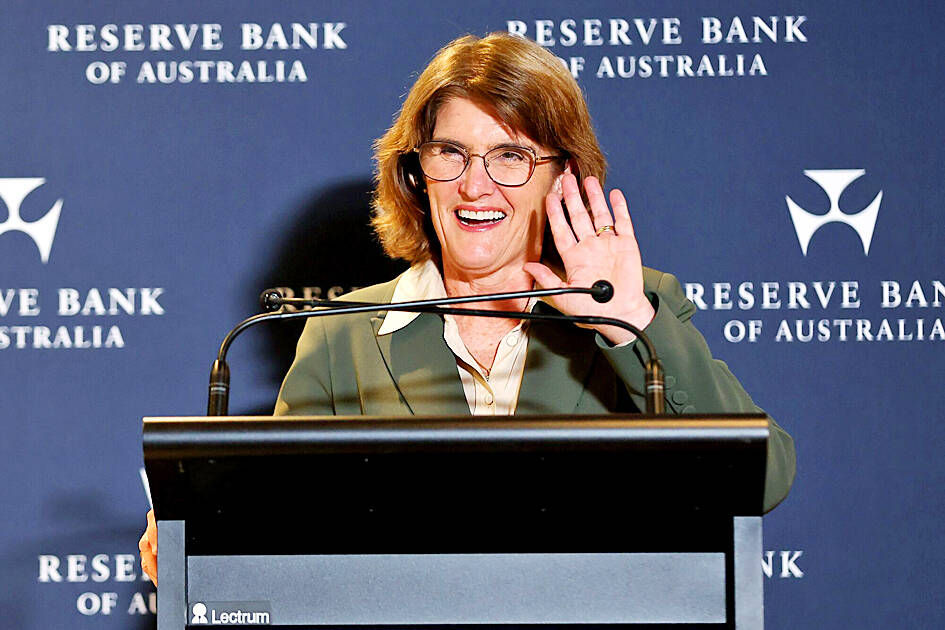Australia’s central bank yesterday signaled that it would keep its key interest rate at a 12-year high in the near term as it struggles with stubborn inflation that is keeping the country from joining a global easing cycle.
“Based on what we know at the moment rates will remain on hold for the time being,” Reserve Bank of Australia (RBA) Governor Michele Bullock told a news conference in Sydney after keeping the cash interest rate at 4.35 percent for a seventh straight meeting.
Still, the bank is not “ruling anything in or out” on policy, Bullock said.

Photo: Bloomberg
Unlike last month, when policymakers put a rate rise on the table, this time around a hike was not “explicitly considered,” Bullock told reporters.
The central bank is focused on returning inflation sustainably to its 2-to-3 percent target, she said.
The bank is facing increasing pressures at home to lower borrowing costs, with politicians sparring over the outlook on interest rates ahead of an election due by May next year.
Bullock said that the central bank would not be dragged into politics.
Its communication yesterday highlights its outlier status compared with peers. Last week, US Federal Reserve Chairman Jerome Powell led his colleagues to an outsize rate cut designed to preserve the strength of the US economy.
Bullock acknowledged the divergence, saying that other central banks had moved into more restrictive territory than Australia.
Economists generally expect rate cuts in Australia to begin in February next year.
Bullock has repeatedly pushed back against talk of near-term easing, reflecting forecasts that inflation would only return to the RBA’s target range late next year.
That has brought her into the political firing line from members of the ruling Labor party and minority parties that are pushing for a rate cut.
At 3.9 percent, Australia’s core prices remain well above target, driven largely by non-discretionary spending such as insurance, education and housing. The job market remains in good shape with unemployment at 4.2 percent.
Monthly data set to be released today are expected to show that inflation has fallen back within the RBA’s band for the first time since August 2021, reflecting the impact of government energy subsidies and other measures.
Bullock said the board wants to be confident that price growth is moving sustainably back toward the bank’s goal, not just moving in and out.
The RBA’s resistance to easing combined with political jockeying over a pending reform of its board structure has spurred domestic criticism of the bank.
The Greens party is demanding the government use its reserve powers to order the RBA to cut rates as a condition for supporting legislation that would split the board in two — one for monetary policy and the other for governance. The government dismissed the Greens’ suggestion as “crazy.”

Intel Corp chief executive officer Lip-Bu Tan (陳立武) is expected to meet with Taiwanese suppliers next month in conjunction with the opening of the Computex Taipei trade show, supply chain sources said on Monday. The visit, the first for Tan to Taiwan since assuming his new post last month, would be aimed at enhancing Intel’s ties with suppliers in Taiwan as he attempts to help turn around the struggling US chipmaker, the sources said. Tan is to hold a banquet to celebrate Intel’s 40-year presence in Taiwan before Computex opens on May 20 and invite dozens of Taiwanese suppliers to exchange views

Application-specific integrated circuit designer Faraday Technology Corp (智原) yesterday said that although revenue this quarter would decline 30 percent from last quarter, it retained its full-year forecast of revenue growth of 100 percent. The company attributed the quarterly drop to a slowdown in customers’ production of chips using Faraday’s advanced packaging technology. The company is still confident about its revenue growth this year, given its strong “design-win” — or the projects it won to help customers design their chips, Faraday president Steve Wang (王國雍) told an online earnings conference. “The design-win this year is better than we expected. We believe we will win

Quanta Computer Inc (廣達) chairman Barry Lam (林百里) is expected to share his views about the artificial intelligence (AI) industry’s prospects during his speech at the company’s 37th anniversary ceremony, as AI servers have become a new growth engine for the equipment manufacturing service provider. Lam’s speech is much anticipated, as Quanta has risen as one of the world’s major AI server suppliers. The company reported a 30 percent year-on-year growth in consolidated revenue to NT$1.41 trillion (US$43.35 billion) last year, thanks to fast-growing demand for servers, especially those with AI capabilities. The company told investors in November last year that

Power supply and electronic components maker Delta Electronics Inc (台達電) yesterday said it plans to ship its new 1 megawatt charging systems for electric trucks and buses in the first half of next year at the earliest. The new charging piles, which deliver up to 1 megawatt of charging power, are designed for heavy-duty electric vehicles, and support a maximum current of 1,500 amperes and output of 1,250 volts, Delta said in a news release. “If everything goes smoothly, we could begin shipping those new charging systems as early as in the first half of next year,” a company official said. The new